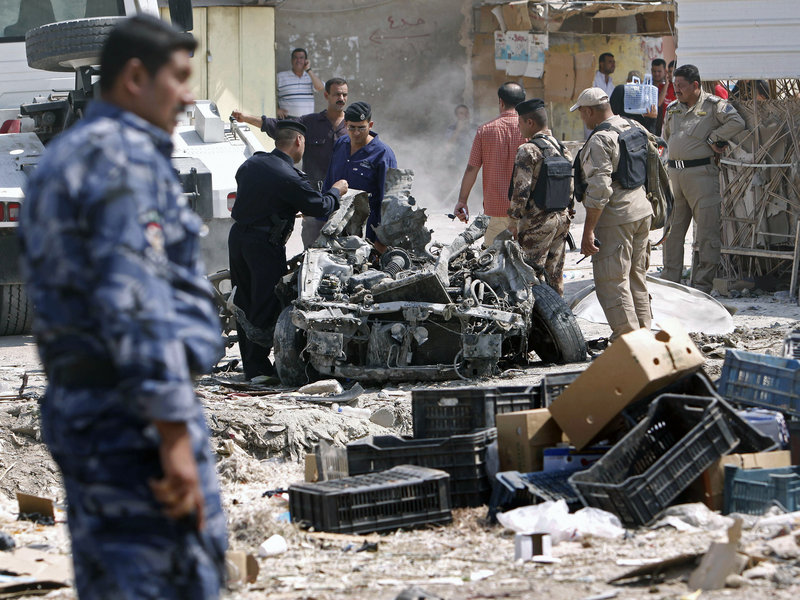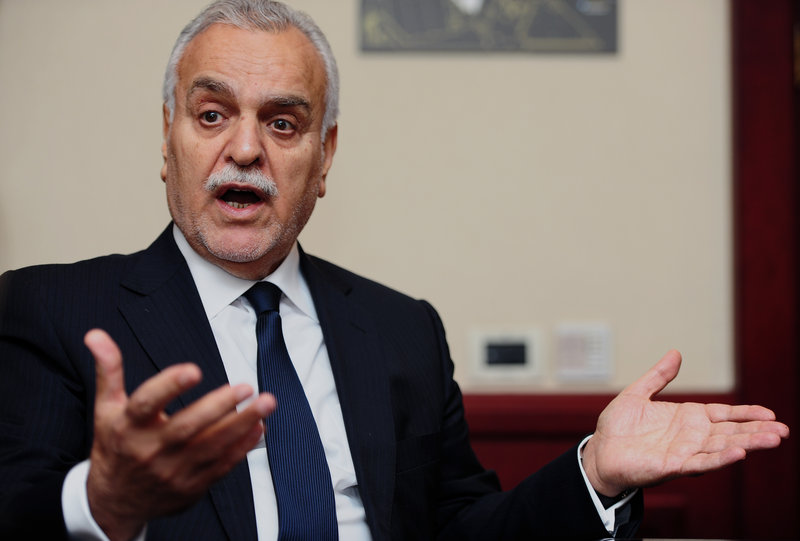BAGHDAD – Iraq’s fugitive Sunni vice president was sentenced Sunday to death by hanging on charges he masterminded death squads against rivals, capping a terror trial that has fueled sectarian tensions in the country. Underscoring the instability, insurgents unleashed an onslaught of bombings and shootings across Iraq, killing at least 92 people in one of the deadliest days this year.
It’s unlikely that the attacks in 13 cities were all timed to coincide with the afternoon verdict that ended a months-long case against Vice President Tariq al-Hashemi, a longtime foe of Shiite Prime Minister Nouri al-Maliki. Still, taken together, the violence and verdict could energize Sunni insurgents bent on returning Iraq to the brink of civil war by targeting Shiites and undermining the government.
Al-Hashemi fled to Turkey in the months after the Shiite-led government accused him of playing a role in 150 bombings, assassinations and other attacks from 2005 to 2011 — years in which the country was mired in retaliatory sectarian violence that followed the 2003 U.S.-led invasion that ousted Saddam Hussein’s Sunni regime. Most of the attacks were allegedly carried out by al-Hashemi’s bodyguards and other employees, and largely targeted government officials, security forces and Shiite pilgrims.
The vice president declined to immediately comment on the verdict after meeting with Turkish Foreign Minister Ahmet Davutoglu in Ankara. He said he would “tackle this issue in a statement” soon.
The politically charged case — which was announced the day after U.S. troops withdrew from the country last December — sparked a government crisis and fueled Sunni Muslim and Kurdish resentment against al-Maliki, whom critics say is monopolizing power.
Violence has ebbed significantly, but insurgents continue to stage high-profile bombings and shooting rampages. Al-Qaida’s Iraq branch has promised a comeback in predominantly Sunni areas from which it was routed by the U.S. and its local allies after sectarian fighting peaked in 2007.
“These attacks show al-Qaida’s ability to hit any place in Iraq and at any time,” said Ali Salem, 40, an elementary school teacher in Baghdad. “The lack of security could take us back to zero.”
The worst violence Sunday struck the capital, where bombs pounded a half-dozen neighborhoods — both Sunni and Shiite — throughout the day.
But the deadliest attacks in Baghdad hit Shiite areas Sunday evening, hours after the al-Hashemi verdict was announced.
In all, 42 people were killed in the capital, according to police and hospital officials who spoke on condition of anonymity because they were not authorized to release the information.
The countrywide attacks began before dawn, with gunmen killing soldiers at an army post in the central Iraqi city of Dujail. A few hours later, a car exploded in a lot where police recruits were waiting in line to apply for jobs outside Kirkuk in the country’s north. Both Dujail and Kirkuk are former insurgent strongholds.
Over the day, at least 92 people were killed in at least 21 separate bombings and shootings, according to reports from police and hospital officials. No group immediately claimed responsibility, but Iraq’s Interior Ministry blamed al-Qaida in Iraq.
Baghdad’s criminal courtroom was silent Sunday as the presiding judge read out the verdict. It convicted al-Hashemi and his son-in-law, Ahmed Qahtan, of organizing the murders of a Shiite security official and a lawyer who had refused to help the vice president’s allies in terror cases. The two defendants were acquitted in a third case of the killing of a security officer, due to a lack of evidence.
The court sentenced both men in absentia to death by hanging. They have 30 days to appeal the verdict and could win a retrial if they return to Iraq to face the charges. Al-Hashemi — who has been in office since 2006 — is on Interpol’s most-wanted list, but Turkey has shown no interest in sending the vice president back to Baghdad.
The defense team began its closing statement with a searing indictment of Iraq’s justice system, accusing it of showing no independence and siding with the Shiite-led government.
“From the beginning and through all procedures it has become obvious that the Iraqi judicial system has been under political pressure,” attorney Muayad Obeid al-Ezzi, the head of the defense team, told the court.
The presiding judge immediately interjected, warning that the court would open legal proceedings against the defense team if it continued to heap accusations on the court or the legal system.
Copy the Story Link
Send questions/comments to the editors.




Success. Please wait for the page to reload. If the page does not reload within 5 seconds, please refresh the page.
Enter your email and password to access comments.
Hi, to comment on stories you must . This profile is in addition to your subscription and website login.
Already have a commenting profile? .
Invalid username/password.
Please check your email to confirm and complete your registration.
Only subscribers are eligible to post comments. Please subscribe or login first for digital access. Here’s why.
Use the form below to reset your password. When you've submitted your account email, we will send an email with a reset code.